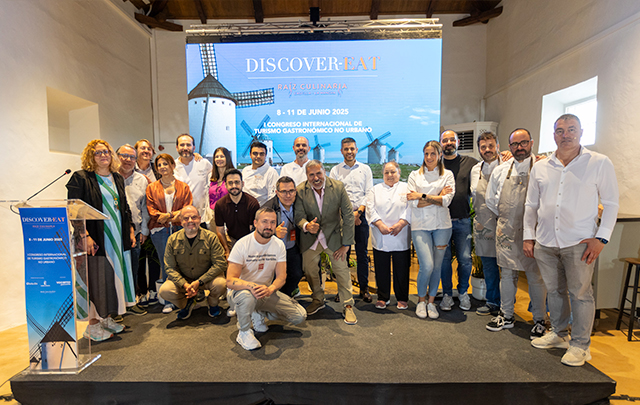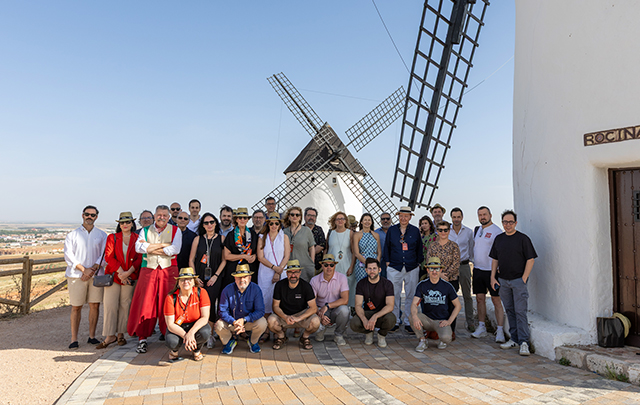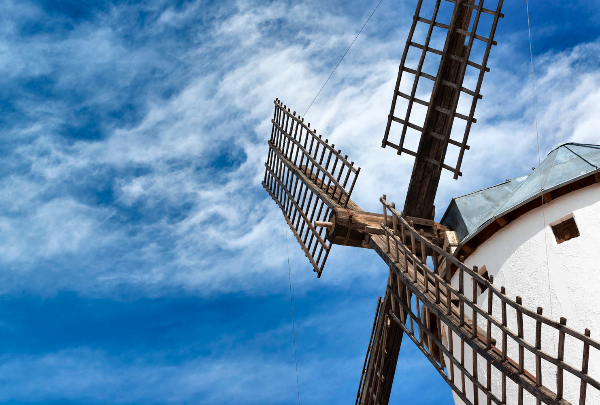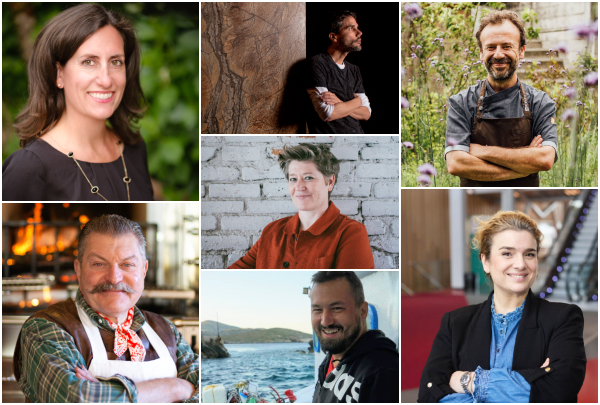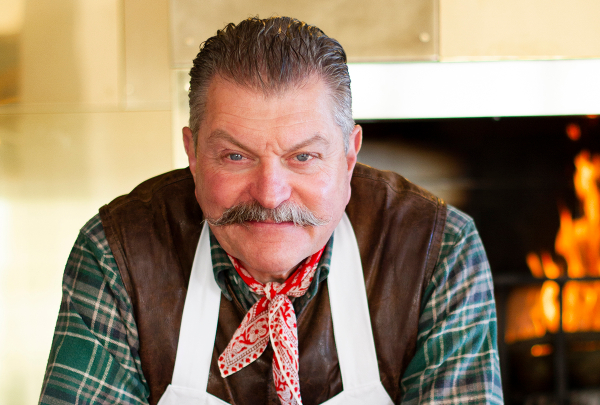News
Discover-Eat analyses the crucial role of gastronomic tourism in developing successful destinations.
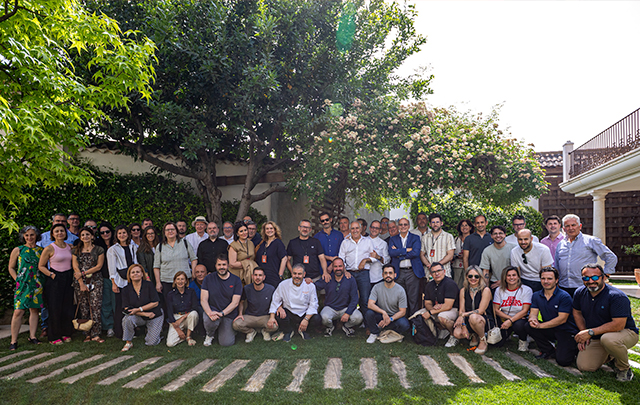
“Gastronomy generates travellers. This is not a trend; it is a reality. Eight out of ten travellers base their choice of destination on where they are going to eat, and four out of ten will travel up to 200 km to try a restaurant.” These were the opening words of Abraham Martín, Global Marketing Director at Pangea The Travel Store, at the launch of Discover-Eat, a forum bringing together gastronomy, tourism, identity, and sustainable rural development in Castilla-La Mancha.
The first edition of the Discovery Eat International Congress on Non-Urban Gastronomic Tourism was officially opened today by the Regional Minister of Economy, Business and Employment of Castilla-La Mancha, Patricia Franco Jiménez, and the Mayor of Campo de Criptana, Santiago Lázaro López. The congress places the authenticity of the product and its territory at the centre of the debate, presenting them as the main arguments for today's experience-based tourism. During the official opening, Benjamín Lana, director of Vocento Gastronomía, stressed that 'the promotion of gastronomic tourism must go hand in hand with improving the quality of life of people living in rural areas, with positive projects that demonstrate that life in villages has a future'.
Gastronomic tourism is therefore popular, and it is important to know how to position oneself in order to attract experiential travellers, such as those capable of climbing to an altitude of 4,000 metres in the Sacred Valley of the Incas, 50 kilometres from Cusco, to experience the Mil Centro project by Virgilio Martínez, head chef at Central in Lima and named the world's best chef in 2023. The Peruvian chef attended the conference to discuss the importance of preserving the ancestral heritage of indigenous communities in order to create added value.“My cuisine is based on the ancestry and ecosystems of Peru at different altitudes, from the Andes to the Amazon. It is therefore important for diners to experience these ecosystems in person before arriving at the restaurant. This immersive experience helps them to understand and enjoy each dish more, while also boosting the destination's economy,” he said.
Passion and authenticity are two important examples
That is why putting rural areas on the gastronomic tourism map is a priority, but not at any price. There is still a long way to go. At the roundtable discussion, Pedro Sánchez, the chef at the Bagá* restaurant in Jaén, criticised the cynicism surrounding the search for authentic products, stating that 'little investment is being made in preserving them. In Spain, we don't take care of our gastronomy when it should be a matter of state,’ and he called for a critical and intelligent approach to prevent mass tourism from erasing the soul of the territory. Gustavo Bassotti, marketing director of THR Strategic Tourism Advisors, believes that 'you need raw materials, tradition and knowledge, as well as understanding your type of traveller and their expectations'. Fernando Valmaseda, CEO of GRUPO RV Edipress and president of the new Network of Gastronomic Villages of Spain, added that 'it is necessary for all the agents involved to unite under a sense of identity and belonging, because a gastronomic destination can only be built with passion and generosity'. Joaquina P. Hernández, CEO of Magnus Nature, agreed, saying that ‘one good way to bring all the stakeholders together and preserve the soul of a territory is to create product clubs based on quality standards and a shared narrative’.
Passion and a sense of identity are undoubtedly key to the success of two of the world's most important gastronomic destinations: California's Napa Valley and the Italian region of Tuscany. "The beauty of Florence has been one of our core values since the 14th century, but now we must also consider the emotions of travellers enjoying attractions such as gastronomy and encourage them to explore the rest of the region," argued Francesco Tapinassi, director general of the Tuscany Tourism Promotion Agency. Joining him was Clara Svanera, the agency's head of women's tourism, who described the Destination Women project as 'based on authenticity, safety, well-being and sustainability, giving visibility to professional women in the region who drive the destination's success'.
Linsey Gallagher, president and CEO of Visit Napa Valley, said in her speech that ‘it is essential to preserve the territory and support local industry, and the tourist tax is useful for this. Above all, we must reinvest all the profits generated by tourism in creating a unique and attractive destination with content beyond wine. This reputation has saved us from catastrophes such as the recent pandemic and fires.’ She highlighted the 'Viva la Buena Vida' campaign, aimed at luxury consumers, as an example. It is estimated to have a positive impact of millions of dollars and thousands of jobs for the five towns that make up the Valley.
"Craftsmanship is what sets Spanish luxury apart"
The first day of Discovery Eat also featured an interesting roundtable discussion about the new definition of luxury and how it can be applied to gastronomy and tourism. “Luxury is based on product or service differentiation, and it is quality and craftsmanship that set Spanish luxury apart,” said Lucía Toro, the managing director of Nuba. This travel agency designs and markets its own products based on the question “What do you want to experience?” rather than “Where do you want to go?”. This commitment to in-depth customer knowledge and micro-personalised experiences is evident in initiatives such as Shapes by Nuba, which offers unique experiences based on art, food, wine and well-being. Enrique Valero, the managing director of Abadía Retuerta, also participated in the event, explaining that ‘luxury is the quality time we offer our customers. More than being a winery or a hotel, we are happiness managers’. This is because today's tourists are travellers seeking an authentic connection with their surroundings. 'Culture and gastronomy are our Silicon Valley, and we must believe in this and trust it because it is in our DNA,' he said, adding that training is necessary 'to exceed the expectations you generate'.
For Pepe Simón Gámez, CEO of Málaga-based Dehesa Monteros, luxury is also 'truth and authenticity'. He believes that 'micro-segmentation is essential, which requires thorough knowledge of each market and its customers', and suggests 'seeking and finding a balance so as not to lose authenticity in a saturated tourist market where locals are not asked what they want for their territory'. Finally, Ramón Cobo, founder of the WoolDreamers brand in Mota del Cuervo (Cuenca), where his family has worked with wool in a traditional way for four generations over 100 years, was also present. "We must take care of the trades that make a region unique. To do this, it is important to link the primary sector more closely with the end consumer", he stressed.

